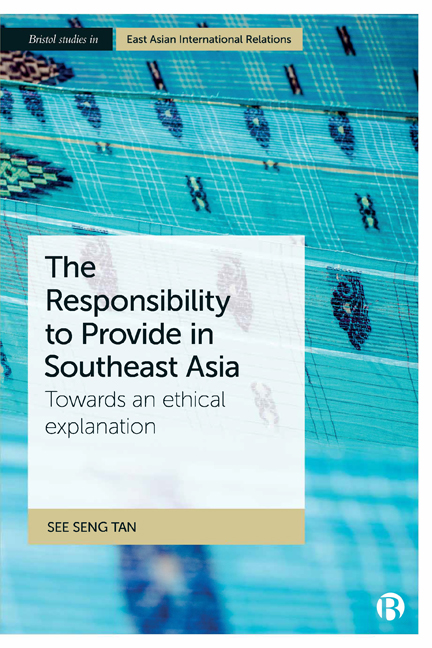Book contents
- Frontmatter
- Dedication
- Contents
- List of Tables
- List of Abbreviations
- Acknowledgements
- 1 Towards an Ethos of Responsibility in Southeast Asia
- 2 The Responsibility to Protect (R2P) and Responses from Southeast Asia
- 3 Towards a ‘Responsibility to Provide’ (R2Provide) in Southeast Asia
- 4 Institutionalizing Security Regionalism: Responsibility as ‘Response Ability’
- 5 Responsible Provision in HADR, Conflict Management and Human Rights
- 6 Towards the Responsible Management of Disputes in Southeast Asia
- 7 Communitarianism, Liberalism and the Limits of Responsibility in Southeast Asia
- 8 Levinas and the Responsibility to Provide in Southeast Asia
- 9 The Responsibility to Provide: Implications for the Region and Beyond
- Notes
- Bibliography
- Index
9 - The Responsibility to Provide: Implications for the Region and Beyond
Published online by Cambridge University Press: 02 March 2021
- Frontmatter
- Dedication
- Contents
- List of Tables
- List of Abbreviations
- Acknowledgements
- 1 Towards an Ethos of Responsibility in Southeast Asia
- 2 The Responsibility to Protect (R2P) and Responses from Southeast Asia
- 3 Towards a ‘Responsibility to Provide’ (R2Provide) in Southeast Asia
- 4 Institutionalizing Security Regionalism: Responsibility as ‘Response Ability’
- 5 Responsible Provision in HADR, Conflict Management and Human Rights
- 6 Towards the Responsible Management of Disputes in Southeast Asia
- 7 Communitarianism, Liberalism and the Limits of Responsibility in Southeast Asia
- 8 Levinas and the Responsibility to Provide in Southeast Asia
- 9 The Responsibility to Provide: Implications for the Region and Beyond
- Notes
- Bibliography
- Index
Summary
In front of the face, I always demand more of myself. (Levinas, 1997: 294)
Introduction
In an address to a symposium on human security at the University of Tokyo in February 2010, the late Surin Pitsuwan, speaking then as the Secretary General of ASEAN, contended that when states focus on securing the well-being of human individuals, they are helping to make sure that ‘state security and state sovereignty are effectively implemented to help, to protect, to promote the welfare, the wellbeing and the dignity security of their own people’ (ASEAN, 2010b). Using language reminiscent of the ‘responsibility to protect’ or R2P but not necessarily referencing that principle or its specific terms, Surin further insisted that ‘sovereignty and national security and state security need to be implemented with responsibility to protect the people, to promote the wellbeing of the people and certainly to guard against their indignity and the suffering that they may have to suffer as member [sic] of our human family’ (ASEAN, 2010b). As his words suggest, there is no question that the R2P – the doctrine of humanitarian intervention for which Southeast Asian countries have furnished at least their declaratory support – has had an impact on the regional debate in Southeast Asia within policy circles and most certainly within academia and the security studies communities. Although Southeast Asian governments have pushed back vigorously against the R2P's advocacy of military intervention against ‘irresponsible’ states – worrisome for a region where sovereignty and non-intervention/non-interference norms remain sacrosanct – it should however in no way, as this book has argued, be seen as a rejection of the notion of responsible sovereignty by the region's leaders and elites.
This book in summary
This book began with the proposition that traces of an ethos of regional responsibility are increasingly evident among the countries of Southeast Asia, some more than others, to be sure. We started the discussion in Chapter 2 by showing what this ethic is not: the UN-endorsed doctrine of ‘the responsibility to protect’ or the R2P. However, short of external intervention, there is in fact much about the R2P – such as the protective responsibilities of states and the timely provision of assistance and capacity-building by the international community (UN, 2009) – that Southeast Asian countries actually welcome if not embrace.
- Type
- Chapter
- Information
- The Responsibility to Provide in Southeast AsiaTowards an Ethical Explanation, pp. 179 - 188Publisher: Bristol University PressPrint publication year: 2019



